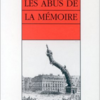Borders have traditionally been seen as places where people and cultures mix and bleed into one another, even though they exist to prevent exactly such an exchange. How can we reconcile the ambiguous nature of the border as that which forbids entry whilst generating both a point of access and the desire for it? I will explore this paradox through a comparative study of Ananda Devi’s Ève de ses décombres, and Gloria Anzaldúa’s Borderlands/La Frontera. Ève and Gloria are two women on the edge of their communities. As bilingual, biracial and gay/bisexual women they don’t fit in on either side of the wall; my thesis is that they become the wall itself. In Anzaldúa’s text, the US-Mexico border is described as an “open wound” which “staking fence rods in my flesh, / splits me splits me”: a body both active and passive, a phallic serpent which she erects as the symbol of her womanhood. Similarly, Ève closes in like a wall around all those who fall for her and prevents them from escaping Troumaron, while she is herself besieged, and her body is a wall where everyone leaves their mark. Are the ruins of the title her own, or just the rubble she leaves behind? By reading Devi and Anzaldúa through classic works of postcolonial and queer theory, I want to uncover whether and to what extent borders can be read (and written) as hybrid bodies or whether they demand permanent crossing over.
Author Bio
Francesca Bellei is a PhD candidate in Comparative Literature at Harvard University. She holds a BA in Classics from the University of Cambridge and an MLitt in Creative Writing from the University of St Andrews. Her research interests include queer, feminist and migration theory, as well as postcolonial and Mediterranean studies.








